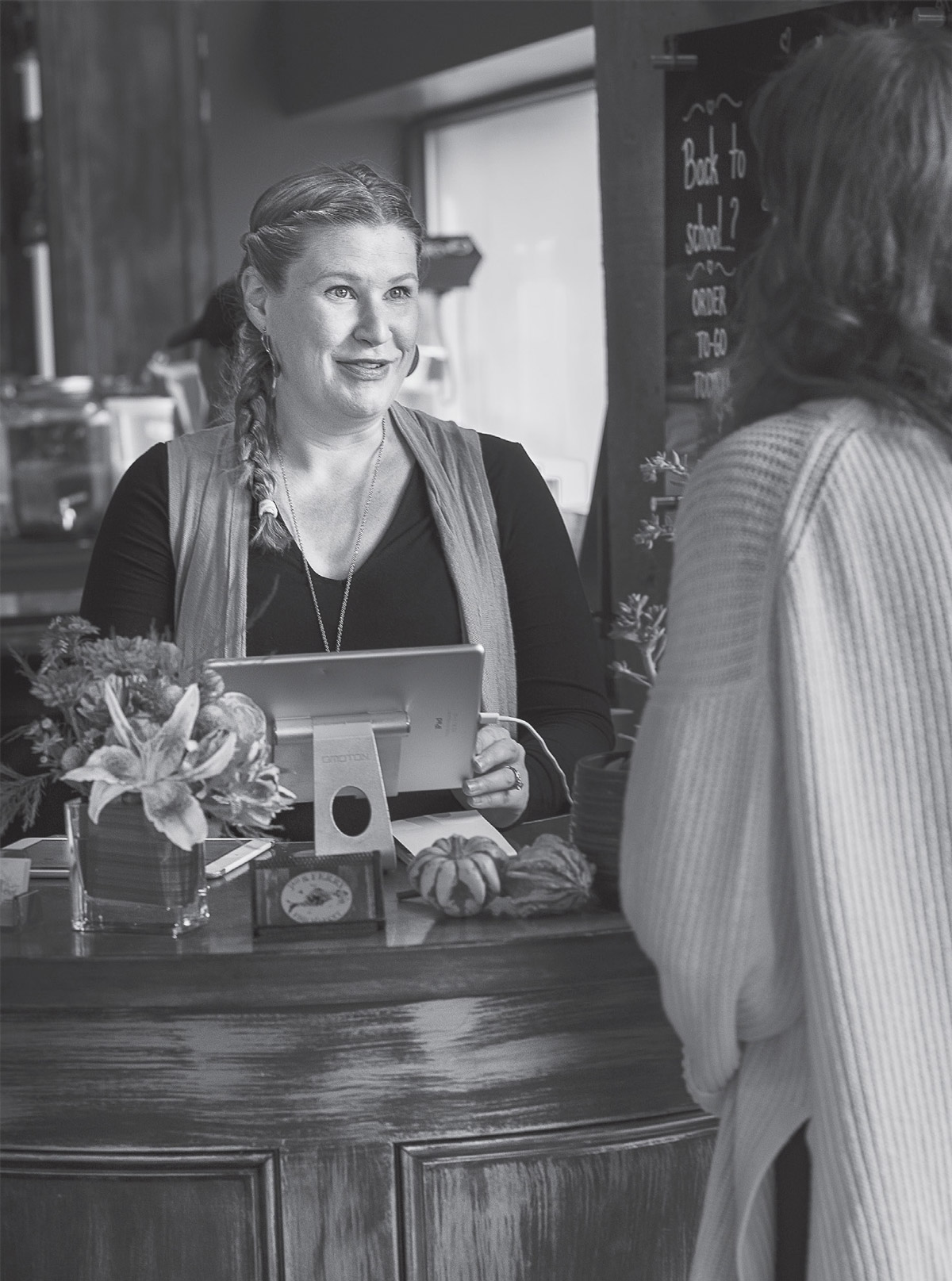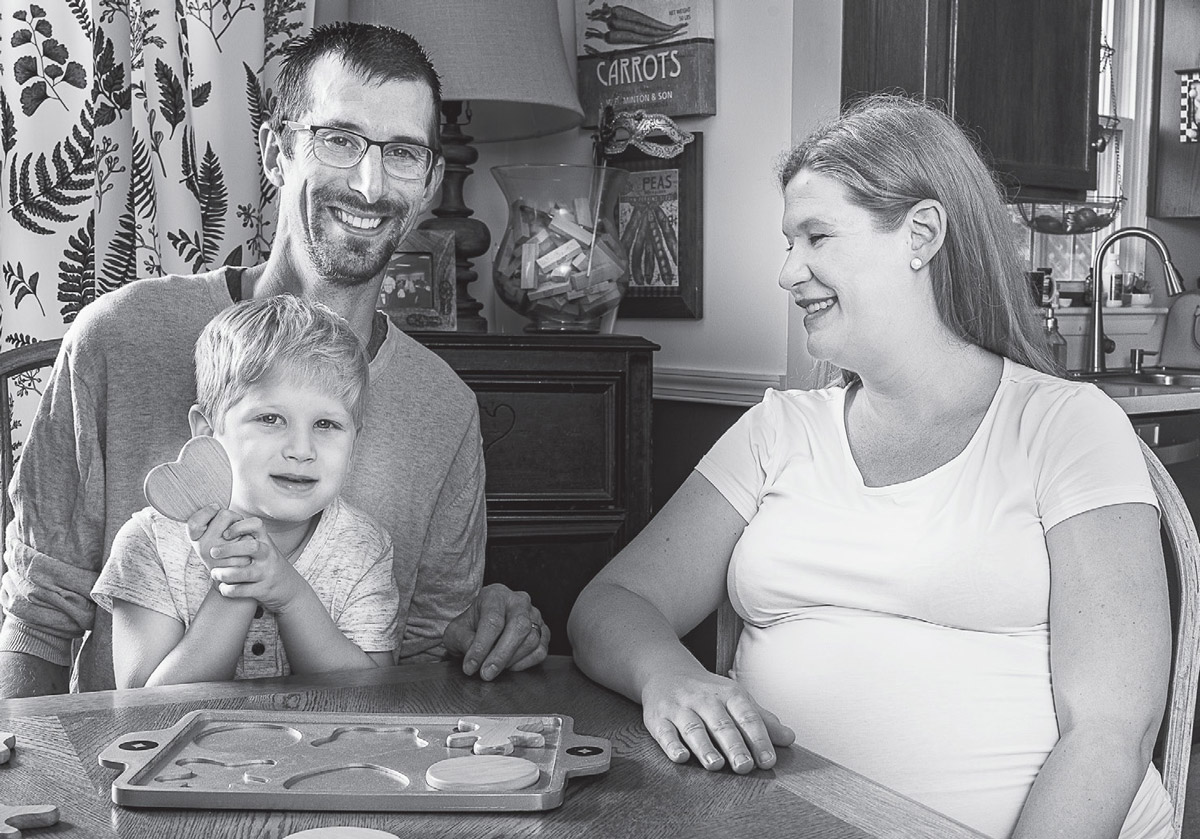BY LAURA HALLMAN BAXTER | PHOTOS BY ROBERTO QUEZADA-DARDÓN

SIGN-UP MORNINGS FOR A NEW SESSION OF LIBRARY CLASSES ARE STRESSFUL. I sit at the dining room table with my morning coffee and my notated list, carefully logging in, making selections, being sure I hit the coveted (and schedule-friendly) slots for story time and music class. I enter identity information repeatedly and check confirmations ad nauseam. Then the calendar sync. Sigh. My coffee is now cold, but we are set for this session.
Now it’s time to make dinner. But wait—how long did this take? How is it time to make dinner? It’s simple. At “normal” dinnertime, I will be at work. My mother will be here babysitting our 4-year-old son, Jack, while my husband, Tyler, guides his culinary students and I cover the front of the house at 3rd & Ferry Fish Market. So, I cook dinner at nine in the morning, make plates, and clean up. Such is the plight of the hospitality worker.
A time crunch like this is certainly not limited to restaurant-industry folk. Most parents are strapped for time. We magically work everything out, get everything done, and get our kid into the remaining slot for Miss Melissa’s Music Class. We rush from work to soccer to the grocery pickup slot and try to find time for laundry in between. It’s hard for everyone, but timing is more challenging if your work is in “the industry”—meaning you work at a restaurant. Your child-care options are limited. Your schedule is different from everyone else around you; daycare doesn’t operate outside of a 9-to-5 paradigm.
Admittedly, being industry makes so much of my life possible. But that didn’t come without some tough lessons, sacrifices, and changes. Two-and-a-half years ago, Tyler left the restaurant where he was the executive chef. He had been working 12- to 16-hour days in a kitchen for 17 years, often for six days a week. He missed holidays, family events, and large chunks of our son’s infancy. So we made a change.
We traded those struggles for other ones, but chose what worked better for our family. Leaving a restaurant you love is hard. Leaving a place where you have invested effort and passion with people who matter to you is hard. However, missing the baby years and feeling absent is also hard.
The Pros and Cons of Restaurant Work
With that change, we achieved a balance and that balance makes it easier for me to relish the positives about industry life. When others are at an office and Tyler is teaching culinary students, I get the mornings. I can take our son to activities. I am mere weeks away from giving birth to my second child—and when you read this, I will undoubtedly be sitting on my couch snuggling that newborn. But that means I can schedule my copious medical appointments in the morning, when everyone else is working in their cubicles. Also, errands are so much easier to pull off on Monday mornings than on the weekend. (Especially Target.)
Then there are negatives. I would never suggest that motherhood in a different profession is easier. Every job provides unique challenges. But for instance, in our industry, do you know how difficult it is to try to sneak away to pump, tucked away in the liquor room because it’s the only room that locks, has an electrical outlet, and is inaccessible to guests? Plus, you have to time it based not only on when you physically need to, but also so that your tables don’t gripe about your 15-minute disappearance.
Sure, someone is trying to cover for you, but things get busy and people are apt to complain when they think they are being ignored. But really, you are just looking at cute pictures of your baby and attempting calming breaths to help milk production. You’re trying not to obsess over the fact that you didn’t tell a co-worker where the party of 10 needs to go. And then you’re clearly labeling the milk so it won’t accidentally get mistaken for something else after you stash it on the “staff food” shelf in the fridge.
Then there’s coming home at very late hours. Your child is still going to get up early in the morning. They didn’t have a late pop because the State Theater let out, or an issue balancing their cash out, or a shift drink to unwind that turned into several hours of hanging out with staff at the bar after close, because you just needed some adult interaction. The baby will be up early, and you must be, too.
The Elusive Appeal of the Hospitality Industry
You might be wondering, why do we do it? Why not get a job with traditional hours? Sure, everybody struggles with work-life balance. We all sort out the pros and cons of what seems best for us. We chose who we are at home and at work, and where the two may meet. And if we are lucky, the two meet in our work.
Restaurant work seems to do that for me. I have come in and out of it since college. I’m good at parts of it; it makes sense to me. I married a chef, so our lives inherently felt like an extension of steps of service and mise en place for the 12 years we have been together. Our son only recently came to understand that people can have jobs that aren’t in restaurants.
I imagine that those who walk out of a child-centered home life to an office experience similar pangs and problems. Some days, it feels like I spend the morning being yelled at by a small child who wants what he wants, when he wants it, regardless of how irrational, only to then spend the evening being yelled at by grown-up patrons who want what they want, when they want it, regardless of how irrational. And then there are the shifts where people are happy to be dining out and they have reasonable requests I can happily grant while the rest of the restaurant is able to get through service smoothly, too.
Most days, I enjoy the interaction. I like witty exchanges with guests and the blue banter in the staff areas. I like kids bursting in to tell me about the Crayola Factory they just visited. I like hearing the guys behind the line in their well-rehearsed choreography while the tickets are called and the food goes out to tables in an orderly fashion. Then there are the days where nothing goes right. But we don’t need horror stories today.

So why do we do it? If you haven’t worked an industry job, I don’t know how to explain the draw to you. Even with the roadblocks it throws up, there is something about this life and this work where you either hate it and sink—or, you love it, start to swim, and immediately want to train for the Olympics.
This struggle for childcare is nothing new. Particularly post-pandemic, we refer frequently to the “childcare crisis.” Daycare is astronomically expensive—and that’s if you can get a spot. After extended periods at home, when daily life was disrupted, our country is, by necessity, having difficult conversations about work and childcare. Our industry, too, is having difficult and necessary conversations about mental health and work-life balance. But for industry parents, balancing work and childcare was a tough tightwire to walk long before anyone was uttering “shutdown.” This aspect of our struggle has not yet entered the conversation in our industry in a meaningful way.
Childcare options are limited for those of us in hospitality because our schedules are so atypical. If you don’t have a family member or close friend able and willing, you’re out of luck. Private sitters are hard to find and come at a cost, too. This seems especially true if both parents work in the industry, exactly as we do.
We realize our family has been extremely fortunate to have my mother as our childcare. She retired before our son was born and happily agreed to take on several days each week. She understands my schedule. I often don’t know when I’ll be getting home. It depends on how things are going. She just shrugs and carries on when I say I have to stay late, or I have to go in early because there’s been an unexpected staff change.
Unfortunately, our schedule rotation spun out this summer. My mother suffered an unexpected and catastrophic medical condition. Literally overnight she went from caring for our son several days a week to needing complete around-the-clock care herself after a stint in the ICU. Coordinating schedules now feels like hanging onto a moving train by our fingernails and never letting go, and it’s only going to move faster once our daughter arrives. While my mother continues to work on her recovery, she has a long road ahead of her. It’s unclear whether she will be able to handle our schedule again– whatever it looks like. Right now, without my mother taking such a role in childcare, our schedule doesn’t work. It’s a triangle that cannot stand if you remove one side.
Some things about the future are foggy and some are clear as crystal. I know for sure that my daughter will be here soon and change everything about our life, again. And I know that my son has secured spots for all his preferred classes this session, and that I will be so lucky to be there with him. But I don’t know how we will navigate whatever this new work-life situation looks like. I do know, however, that we will assemble our needs like a kitchen prep list, and sort it like the game of Tetris that accompanies seating a busy restaurant on a Saturday night. This is what we do.




